Latest DePIN News
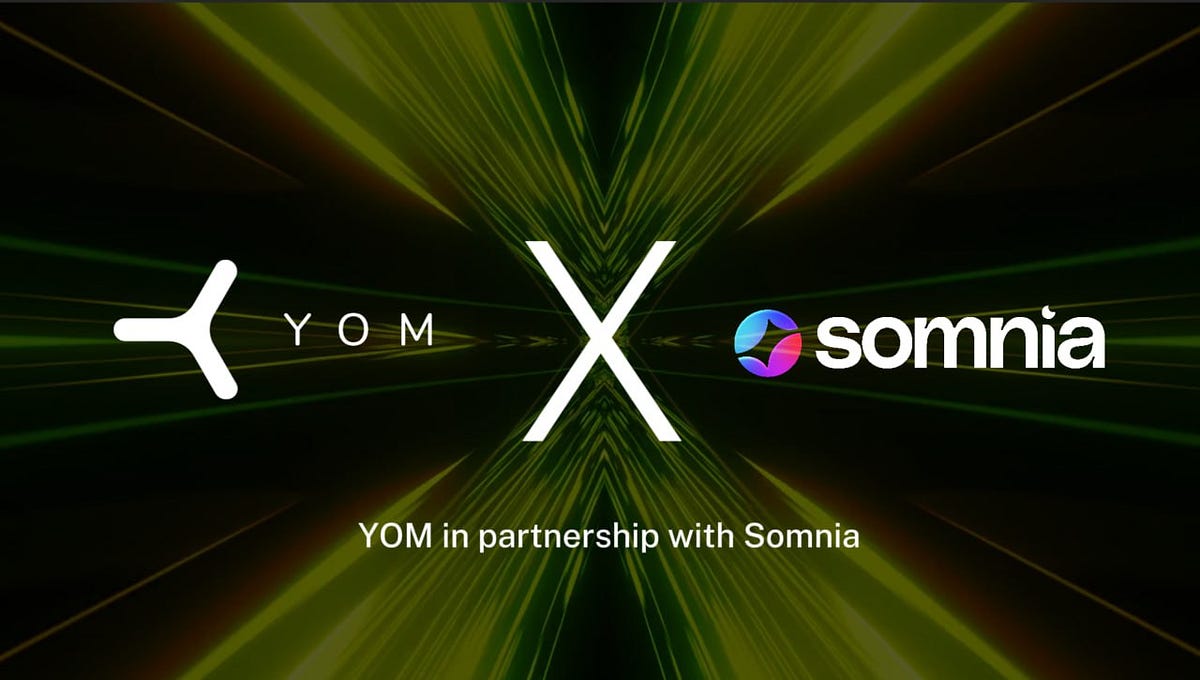
2 months ago
YOM Partners with Somnia to Transform Cloud Gaming
The crypto multiverse is witnessing significant expansion with the recent partnership between YOM and Somnia, a high-performance blockchain tailored for fully on-chain applications. This collaboration positions YOM within Somnia’s ecosystem, which includes 15 other innovative projects across diverse sectors such as DeFi, AI, and gaming. The synergy between YOM’s peer-to-peer cloud gaming platform and Somnia’s capabilities is poised to revolutionize the gaming landscape, particularly with YOM's unique DePIN (Decentralized Physical Infrastructure) model that drastically reduces gaming costs from $6 per hour to just $0.30 per hour.
This partnership holds substantial implications for the YOM community. Firstly, YOM gains increased visibility by aligning with notable players like QuickSwap, Stargate, and Alchemy Pay within Somnia’s ecosystem. Additionally, Somnia’s scalable infrastructure promises enhanced performance for YOM’s cloud gaming services, ensuring they remain seamless, secure, and fast. Furthermore, this collaboration opens up new opportunities for YOM’s node operators and community members, providing them with access to a broader network of users, builders, and developers who are part of the Somnia ecosystem.
Looking ahead, YOM plans to showcase its capabilities during Somnia’s Testnet launch. This initiative will provide exclusive insights, events, and opportunities for the community as they embark on this exciting partnership. With Somnia’s robust blockchain infrastructure combined with YOM’s innovative cloud gaming technology, the future looks bright for decentralized gaming, enabling users to stream AAA-quality games from any device in a fast, affordable, and decentralized manner. YOM is committed to making gaming accessible for everyone, everywhere.
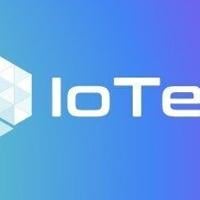
2 months ago
IoTeX Welcomes Xangle as Validator to Boost DePIN Ecosystem
IoTeX, a prominent player in the Decentralized Physical Infrastructure Network (DePIN) sector, has recently announced that Xangle, a leading blockchain infrastructure company from Korea, will join its network as a validator. This partnership is expected to enhance IoTeX's community-driven ecosystem and improve its technical stability. Xangle, known for its ecosystem-oriented community hubs and Web3 analytical reports, has been a significant contributor to the Web3 space since launching Xangle Portal in 2018, and has also validated for other major blockchain projects like Aptos and Babylon.
In 2024, IoTeX has emerged as a leader in the DePIN sector, processing over 150 million transactions and 340 million blocks, with an impressive annual growth rate exceeding 25%. Currently, more than 360 million IOTX tokens are staked, representing about 40% of the total supply, which significantly bolsters the network's security and governance. This growth underscores IoTeX's commitment to providing robust infrastructure solutions within the DePIN landscape, solidifying its position as a key player in the industry.
Lihan Lee, Co-CEO of Xangle, emphasized that their role as an IoTeX validator is a pivotal step towards making innovative Web3 infrastructures more accessible and promoting their mainstream adoption. Jing Sun, co-founder of IoTeX, echoed this sentiment, highlighting that Xangle's expertise will enhance the network's credibility and stability. Together, they aim to drive the sustainable growth of the DePIN ecosystem, ensuring that IoTeX remains at the forefront of blockchain infrastructure development.
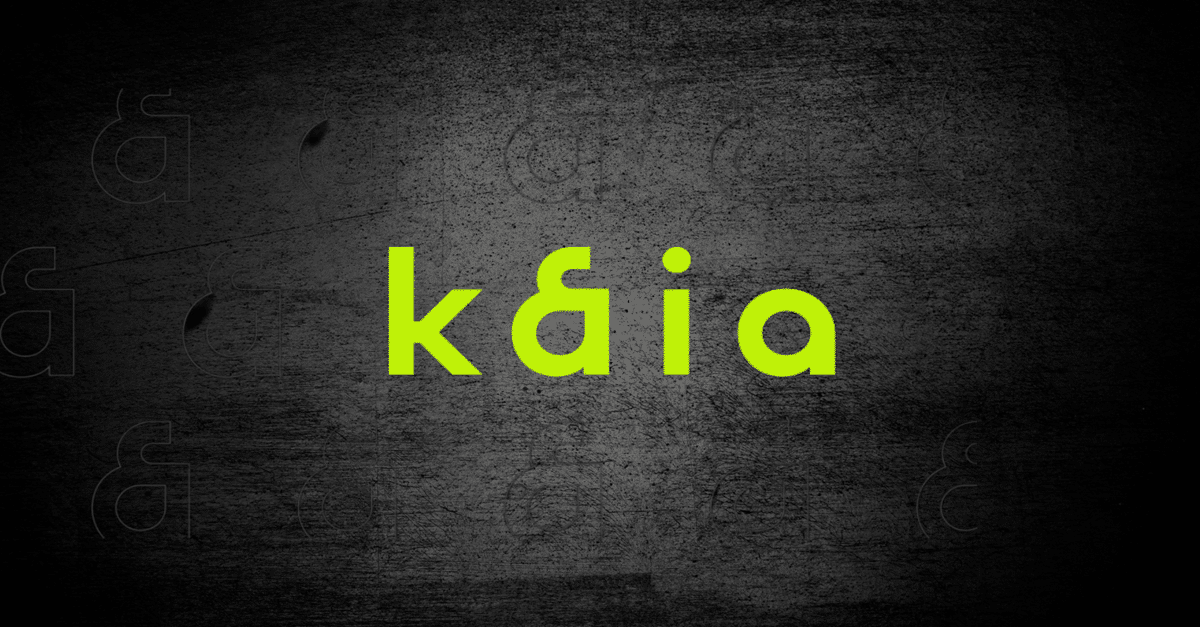
2 months ago
Crypto Market Update: Theta's New Partnership and Emerging Investment Opportunities
The global cryptocurrency market is currently valued at $2.69 trillion, reflecting a modest increase of 1.20% over the past day. However, trading volume has seen a significant decline of 23.50%, dropping to $119.79 billion, indicating a slowdown in short-term trading activity. Despite this downturn, many investors are seizing the opportunity to buy the dip, fueled by optimism surrounding recent market developments and evolving policies. Notably, cryptocurrencies like Gala (GALA), Immutable (IMX), and Kaia (KAIA) are emerging as strong investment candidates, showcasing resilience and potential for growth in this fluctuating market.
Theta Network has recently made headlines with its partnership with Nubila, a decentralized physical infrastructure network focused on gathering real-world weather data. This collaboration will leverage Theta's EdgeCloud GPU resources for training AI models, marking a significant expansion beyond its original video streaming focus. Currently, Theta's token (THETA) is trading at $0.87, with a market cap of $759.25 million. Analysts are optimistic, predicting a potential price increase of 22.48% by April, as the platform continues to evolve its offerings in the Web3 space.
In addition to Theta, the Meme Index (MEMEX) has gained traction by offering a diversified investment approach to meme coins, raising over $3.9 million in its presale. Meanwhile, Kaia DLT Foundation is making strides in the blockchain ecosystem with its Mini Dapps, attracting over 35 million users in just a month. As these projects develop, they highlight the dynamic nature of the crypto market, where innovative solutions and strategic partnerships are paving the way for future growth and investment opportunities.

2 months ago
Coinbase Unveils New Token Listing Roadmap Featuring Aethir and Syrup
Coinbase, one of the largest cryptocurrency exchanges globally, has unveiled its latest token listing roadmap aimed at enhancing transparency and reducing ambiguity for its users. The roadmap highlights two significant tokens, Aethir ($ATH) and Syrup ($SYRUP), which are expected to be added to the platform shortly. This initiative is part of a broader strategy by Coinbase to keep traders informed and streamline the listing process, allowing them to make more informed decisions based on upcoming listings. Given Coinbase's influential role in the crypto market, the addition of these tokens could significantly impact their visibility and trading dynamics.
Aethir ($ATH) is a decentralized cloud computing platform that leverages blockchain technology to provide a more secure and cost-effective alternative to traditional cloud services. Unlike conventional providers, Aethir allows users to rent computational resources in a decentralized manner, enhancing security by distributing computing power across a broader network. This innovative approach addresses the issues of security, cost, and transparency prevalent in the current cloud computing model. Aethir's inclusion in Coinbase's roadmap underscores the growing trend of integrating blockchain solutions into various industries, particularly in cloud computing.
On the other hand, Syrup ($SYRUP) serves as a governance token within the Maple ecosystem, a decentralized finance (DeFi) platform that connects institutional investors with digital asset lending opportunities. Syrup holders play a crucial role in decision-making processes that shape the platform's future, making it an integral part of Maple's community-driven approach. The addition of both Aethir and Syrup to Coinbase's listing roadmap not only signifies their potential growth but also reflects a shift towards greater transparency in token listings, fostering user trust and confidence in the cryptocurrency ecosystem.
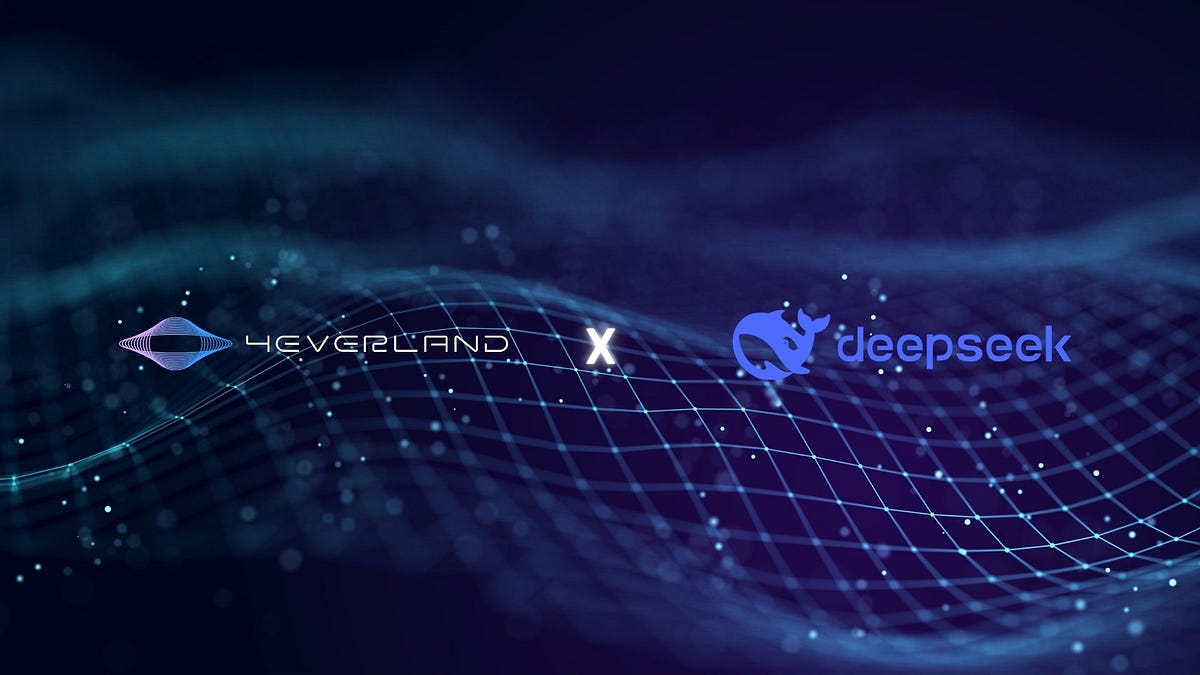
2 months ago
4EVERLAND AI RPC and 4EVER Chat: A New Era in AI Model Integration
The recent integration of 4EVER Chat into the Awesome DeepSeek Integration represents a pivotal advancement for the 4EVERLAND AI RPC infrastructure. This collaboration establishes AI RPC as a "highway for models," enabling developers to access both DeepSeek and over 200 large language models (LLMs) through a single API. With industry-leading stability and speed, 4EVERLAND AI RPC enhances the DeepSeek model by providing an enterprise-grade decentralized network layer. Furthermore, 4EVER Chat stands out as the first AI Agent framework that supports multi-chain private interactions, allowing developers to create compliant AI applications without depending on third-party services. This integration signifies a significant convergence of Web3 and AI infrastructure, offering developers seamless access to the DeepSeek model while challenging the dominance of traditional cloud computing giants in AI computation power.
In the current landscape of artificial intelligence and big data, the multitude of AI models available can make it challenging for developers to choose the right one for their specific needs. The complexities involved in deploying large-scale open-source LLMs can also hinder market entry. 4EVERLAND addresses these challenges by providing a standardized AI RPC API that simplifies the integration of AI functionalities into applications. This streamlined approach allows businesses to enhance their services, improve operational efficiency, and deliver personalized user experiences through tailored AI solutions. By utilizing AI RPC, enterprises can significantly reduce the complexities associated with deploying LLMs, making it an essential tool for enhancing applications, services, or research projects.
The integration of AI RPC and 4EVER Chat aims to create an ecosystem akin to an "electric grid" for AI applications. Developers gain on-demand access to LLM capabilities without the need for in-house infrastructure, while model providers like DeepSeek function as "power plants," generating revenue through network effects. This innovative approach allows enterprises to shift from self-sufficiency to leveraging an intelligent grid, focusing on innovation rather than operational burdens. By standardizing model deployment and emphasizing cost-efficiency and performance optimization, 4EVERLAND and DeepSeek are democratizing access to AI, making LLMs more accessible to developers across various sectors.

2 months ago
Marta Belcher: Pioneering Women in Blockchain Law
On the eve of International Women’s Day, we had the opportunity to speak with Marta Belcher, a trailblazer in blockchain law and a prominent advocate for civil liberties. As the president of the Filecoin Foundation and its sister organization, the Filecoin Foundation for the Decentralized Web, Belcher has made significant contributions to the cryptocurrency landscape. Her extensive experience includes serving as general counsel and head of policy at Protocol Labs, as well as holding positions on the Board of Directors of Creative Commons and the Blockchain Association. Belcher's influence extends to legislative bodies worldwide, where she has testified on crypto policy, showcasing her dedication to shaping the future of blockchain technology.
Belcher's journey into technology policy began during her college years when she led a nonprofit organization called No Worries Now, which supported teens with life-threatening illnesses. This experience opened her eyes to the impact of technology on healthcare, particularly in advocating for public umbilical cord blood banking. Her early advocacy work laid the foundation for her career in technology law, where she recognized the potential of blockchain to protect civil liberties and privacy. Since her first involvement in the blockchain space in 2015, Belcher has been instrumental in various initiatives, including writing the first blockchain-transferable software license and defending patent litigation against blockchain companies.
Despite holding multiple roles, Belcher emphasizes a strategy of 'work-life integration,' driven by her mission to leverage technology for civil liberties. She highlights the presence of remarkable women in the crypto industry, countering the narrative of a male-dominated space. With a leadership team at the Filecoin Foundation that is predominantly female, Belcher believes that the focus on talent rather than gender has led to a diverse and effective organization. Her insights reflect a growing recognition of women's contributions to the blockchain sector, underscoring the importance of inclusivity in shaping the future of technology.

2 months ago
US Senate Banking Committee to Vote on Updated GENIUS Act for Stablecoin Regulation
The US Senate Banking Committee is preparing to vote on the Republican-led stablecoin framework bill known as the GENIUS Act on March 13. This bill has undergone significant revisions following bipartisan discussions, with input from both Democratic and Republican senators. Co-sponsor Senator Bill Hagerty announced the updated version on March 10, emphasizing its improvements in key areas such as consumer protections, authorized stablecoin issuers, risk mitigation, and transparency. The bill aims to regulate US dollar stablecoin issuers with market caps exceeding $10 billion, primarily targeting Tether (USDT) and Circle's USDC, under Federal Reserve oversight, while allowing smaller issuers to choose state-level regulation.
The latest updates to the GENIUS Act have sparked discussions within the crypto community, particularly regarding the competitive landscape for stablecoins. Dom Kwok, co-founder of the Web3 learning app EasyA, noted that the bill provides US-issued stablecoins with a competitive advantage over foreign counterparts. The updated legislation imposes stringent standards on foreign stablecoin issuers concerning reserve and liquidity requirements, as well as compliance with anti-money laundering regulations. This could potentially disadvantage many foreign issuers, giving USDC and Ripple Labs' Ripple USD (RLUSD) an edge in the market.
Despite these advancements, the GENIUS Act still faces hurdles before it can be enacted into law. Following the Senate Banking Committee's vote, the bill will proceed to a full Senate floor vote, where it will be subject to further debate. If it successfully passes through the Senate, it will then move to the House of Representatives. Should the House approve the bill without amendments, it will be sent to President Donald Trump for final approval or veto. The outcome of this legislative process could significantly shape the regulatory landscape for stablecoins in the United States.
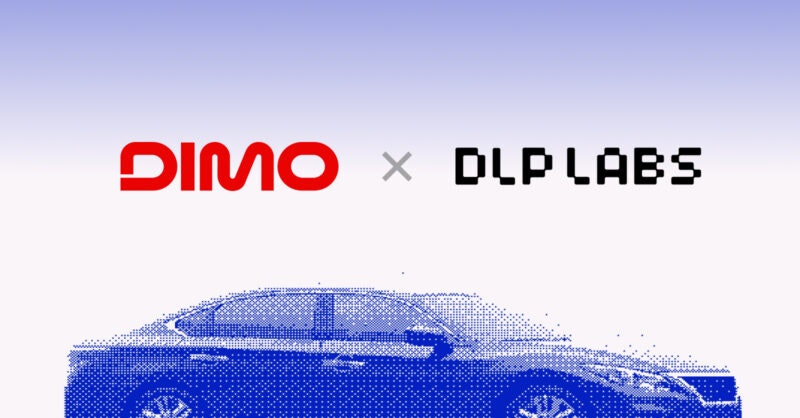
2 months ago
DIMO Partners with DLP Labs to Monetize Vehicle Data
DIMO has announced a partnership with DLP Labs aimed at empowering vehicle owners to monetize their car data through secure, user-owned AI technology. This collaboration allows users to participate in data-sharing programs, enabling them to earn rewards as developers create innovative applications and services. With just a few clicks, DIMO users can qualify for the upcoming Token Generation Event (TGE) for $DLP tokens, ensuring they maintain full control over their vehicle data while benefiting from its value.
The initiative introduces several incentives for early adopters, including participation points that can be converted into $DLP tokens during the TGE. Users can opt in and out of data sharing at their discretion, allowing them to manage how their vehicle data is utilized. This data will contribute to the development of privacy-preserving AI applications across various sectors, including mobility and energy. The process to get started is straightforward: users need to create a DIMO account, log in to DLP Labs, and connect their wallets to begin earning points that will enhance their token allocation during the TGE.
DLP Labs emphasizes the importance of granting permissions for full vehicle data access, which is essential for developers to create applications that improve mobility and energy efficiency. Users can opt out of data sharing at any time, ensuring their control over personal data. This partnership is set to evolve, promising new earning opportunities and expanded use cases for DIMO users. As the value of vehicle data continues to grow, DIMO users are encouraged to take advantage of this innovative approach to monetize their data effectively.

2 months ago
Render Network Explores Decentralized AI Innovations at ETH Denver 2025
The Render Network has made significant strides in decentralized AI and DePIN (decentralized physical infrastructure networks) at ETH Denver 2025. This event underscored the increasing relevance of decentralized AI in real-world applications, with Render Network leading discussions on the integration of blockchain, AI, and decentralized computing. A highlight was the co-hosted event "DeAI Day: Dawn of the Agents," where industry leaders such as MorpheusAI and VeniceAI convened to explore the synergy between DePIN and decentralized AI protocols, particularly focusing on the emergence of on-chain AI agents. Trevor Harries-Jones from Render emphasized the efficiency of distributed GPUs in managing AI workloads, thereby enhancing accessibility for decentralized AI development.
During the mainstage discussions, Render Network's AI scout, Paul Roales, participated in a panel titled "Bitcoin for AI: The Poster Children Catalyzing Decentralized Intelligence." This panel highlighted the critical role of decentralized computing in the AI economy, particularly in powering on-chain agents and scaling consumer AI applications. Roales pointed out the growing capabilities of consumer GPUs, which are essential for democratizing access to AI technologies. The discussions also included Render Network's participation in IoTeX’s "DePIN ❤️ AI" event, where Phil Gara elaborated on the transformative impact of decentralized infrastructure on various sectors, including AI, gaming, and finance.
The conversations at ETH Denver extended to envisioning the future of DeAI and AI agents. Tristan Relly from Render Foundation stressed the importance of decentralization in keeping AI models open and accessible, while Gara highlighted how DePINs could foster user-owned AI systems through token incentives. Looking ahead, Render Network is gearing up for RenderCon 2025, where they will further explore the intersections of 3D technology, AI, and GPU computing, featuring insights from industry leaders on the future of creativity and technology integration.

2 months ago
ETHDenver 2025: A Turning Point for DePIN and AI in Crypto
ETHDenver 2025 showcased a vibrant mix of energy and innovation, particularly highlighting the advancements in Decentralized Physical Infrastructure Networks (DePIN) and artificial intelligence (AI). The IoTeX team, including Giuseppe De Luca, Aaron Basi, and Larry Pang, shared their insights during an X Space debrief, emphasizing the event's dual nature as both a celebration and a reality check for the crypto industry. While some projects demonstrated tangible progress, others appeared to be struggling to maintain relevance in an evolving landscape. The discussions at the event underscored the importance of real-world applications and sustainable business models moving forward.
A significant highlight from IoTeX's participation was the R3al World event, which focused on the intersection of DePIN and AI. Key announcements included the integration of GEODNET with ioID, which aims to enhance on-chain verifiable physical AI, and demonstrations of privacy-focused technologies like NovaNet's embedded zero-knowledge proofs on Raspberry Pi devices. The event also featured engaging fireside chats, including one between IoTeX's Larry Pang and industry experts, discussing the future of physical AI and the economic realities of DePIN. These conversations emphasized the necessity for decentralized networks to provide reliable, real-time data to support AI applications and the importance of creating viable economic models beyond mere token incentives.
The overarching theme of ETHDenver was a shift towards real-world utility and revenue generation within the DePIN space. IoTeX's Aaron Basi noted that the focus is now on projects that solve actual problems and generate revenue, moving away from speculative ventures. This evolution is evidenced by the rise of hyper-specialized networks and AI-driven insights that cater to specific market needs. While ETHDenver had its standout moments, it also revealed the industry's growing pains, including regulatory uncertainties and a lack of groundbreaking innovations. As the crypto landscape matures, the emphasis is clearly on creating practical applications that deliver real value to users and businesses alike.
Signup for latest DePIN news and updates